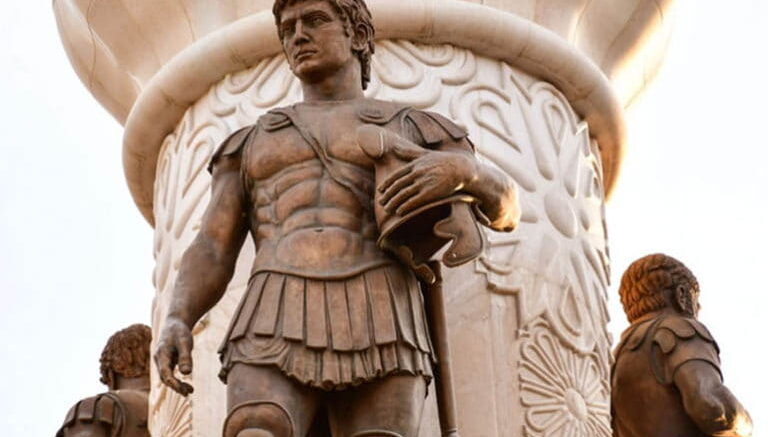This summer the president of MANA is planning an online course on Alexander the Great and the impact of Hellenism on the birth of the New Testament Church. The course will take place in two sessions and will include video presentations, a group discussions and study questions.
The legacy of Alexander the Great extends far beyond his military conquests, deeply influencing the course of Western civilization and the development of the New Testament Church. His vision of a unified world under the banner of “Hellenism” reshaped cultures, religions, and societies across the territories he conquered. This essay explores the profound impact of Alexander’s life on Western history, the integration of Hellenism into Jewish religion during the inter-testamental period, and the role of his successors in shaping subsequent empires, including their influence on the Roman Empire and early Christianity.
Hellenism and Alexander’s Divine Parentage
Alexander the Great’s conquests spread Greek culture and ideas throughout the known world, a process known as Hellenization. This cultural diffusion led to the widespread adoption of Greek language, art, architecture, and philosophy, creating a more cohesive and interconnected world. The “one world” philosophy of Hellenism aimed to blend the diverse cultures within Alexander’s empire into a single, unified civilization. This cultural synthesis laid the groundwork for many aspects of Western civilization, from philosophy and science to literature and governance.
A significant aspect of Alexander’s legacy was the belief in his divine parentage. Many contemporaries and later admirers believed that Alexander was the son of Zeus and an earthly mother, Olympias. This belief not only reinforced his authority but also contributed to the perception of divine kingship, which had a lasting influence on subsequent rulers and empires. The concept of a divine-human hybrid might have influenced early Christian narratives, particularly the birth narrative of Jesus, where divine intervention plays a crucial role.
Hellenism and the Jewish Religion
The period between the Old and New Testaments, known as the inter-testamental period, was marked by significant Hellenistic influence on Jewish religion and culture. Following Alexander’s conquests, many Jews found themselves under Hellenistic rule, particularly in regions governed by the Seleucid and Ptolemaic empires. This period saw a tension between traditional Jewish practices and the encroaching Hellenistic culture, leading to a series of cultural and religious adaptations.
The translation of the Hebrew Bible into Greek (the Septuagint) is one of the most notable outcomes of this Hellenistic influence. The spread of Greek as the lingua franca of the Eastern Mediterranean facilitated broader access to Jewish scriptures and ideas, influencing both Jewish and early Christian thought. However, this period also saw significant conflict, such as the Maccabean Revolt against Hellenistic oppression, which underscored the complexities of cultural integration and resistance.
The Successors of Alexander and Their Influence
Upon Alexander’s death in 323 BCE, his vast empire was divided among his generals, leading to the establishment of several Hellenistic kingdoms: the Seleucid Empire, the Ptolemaic Kingdom, and the Antigonid Dynasty. These successor states continued to promote Hellenistic culture while also engaging in constant warfare and political intrigue.
The Seleucid Empire, founded by Seleucus I, controlled a vast territory stretching from the Mediterranean to India. Its influence on Jewish history was profound, particularly under Antiochus IV Epiphanes, whose attempts to impose Hellenistic practices on the Jews sparked the Maccabean Revolt. The Ptolemaic Kingdom in Egypt, founded by Ptolemy I, became a center of learning and culture, epitomized by the Great Library of Alexandria. This intellectual hub played a crucial role in preserving and transmitting Greek knowledge to later generations, including the Romans.
These Hellenistic kingdoms, with their blend of Greek and local cultures, set the stage for the rise of the Roman Empire. The Roman adoption of many Hellenistic practices, from art and architecture to governance and philosophy, was facilitated by the groundwork laid by Alexander and his successors. This cultural continuity ensured that Hellenistic ideas would continue to shape the Western world long after the fall of these kingdoms.
Impact on the New Testament Church
The spread of Hellenistic culture and language also had a profound impact on the early Christian Church. The New Testament itself was written in Greek, the common language of the Eastern Mediterranean, which facilitated the spread of Christian ideas across diverse regions. Hellenistic philosophical concepts, such as the Logos, were integrated into Christian theology, providing a bridge between Jewish religious traditions and the broader Greco-Roman intellectual world.
The cultural and political landscape shaped by Alexander’s conquests provided the context in which Christianity emerged and spread. The roads and cities built under Hellenistic and later Roman influence, the common language, and the philosophical ideas all contributed to the rapid dissemination of Christian teachings.
Conclusion
Alexander the Great’s conquests and the subsequent spread of Hellenism had a lasting impact on Western civilization and the development of the New Testament Church. His vision of a unified world under Greek culture set the stage for centuries of cultural and intellectual exchange. The integration of Hellenistic ideas into Jewish religion during the inter-testamental period, the influence of his successors, and the Hellenistic context of early Christianity all highlight the profound and enduring legacy of Alexander’s life and conquests. His influence is a testament to the enduring power of cultural synthesis and the far-reaching impact of visionary leadership.

Be the first to comment on "New Online Course on Alexander the Great and Hellenism Scheduled for this Summer"